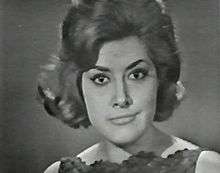Conchita Bautista
María Concepción Bautista Fernández (born 27 October 1936, Seville) better known as Conchita Bautista is a Spanish singer and actress, best known for her participation in the Eurovision Song Contests of 1961 and 1965.
Conchita Bautista | |
|---|---|
 Conchita Bautista at Eurovision 1965 | |
| Background information | |
| Birth name | María Concepción Bautista Fernández |
| Born | 27 October 1936 |
| Origin | Seville, Spain |
| Genres | Pop, Flamenco |
| Occupation(s) | Singer |
Bautista moved from her native Andalusia to Madrid in her teens and quickly established herself as an actress, appearing in a number of films in the 1950s.[1] At the same time she was earning a reputation as an interpreter of Andalusian music and gained a recording contract with the Columbia label.
In 1961, Bautista took part in the selection for Spain's debut Eurovision entry with the song "Estando contigo" ("Being With You"), which was chosen as the country's representative for the sixth Eurovision Song Contest, held in Cannes, France on 18 March.[2] "Estando contigo" was drawn as the contest's opening song, and at the end of voting had placed ninth of the 16 entries.[3][4]
In 1965, Bautista came through a very convoluted selection process to win the Spanish Eurovision ticket a second time with "Qué bueno, qué bueno" ("How Good, How Good"), and went forward to that year's Eurovision which took place on 20 March in Naples.[5] "Qué bueno, qué bueno" was one of four songs (along with those from Germany, Belgium and Finland) which failed to score, representing Spain's second "nul points" following Victor Balaguer in 1962.[6][7]
In later years, Bautista forged a successful recording and touring career in Latin America, Italy, Greece, and Turkey as well as in Spain.
Selected filmography
| Year | Title | Role | Notes |
|---|---|---|---|
| 1955 | The Moorish Queen | Laura | |
| 1958 | Vengeance | Singer | |
| 1958 | La novia de Juan Lucero | ||
| 1962 | Escuela de seductoras | ||
| 1964 | La Boda | ||
| 1971 | A mí las mujeres ni fu ni fa |
References
External links
- Biography (Spanish)
| Preceded by None |
Spain in the Eurovision Song Contest 1961 |
Succeeded by Victor Balaguer with "Llámame" |
| Preceded by Los TNT with "Caracola" |
Spain in the Eurovision Song Contest 1965 |
Succeeded by Raphael with "Yo soy aquél" |